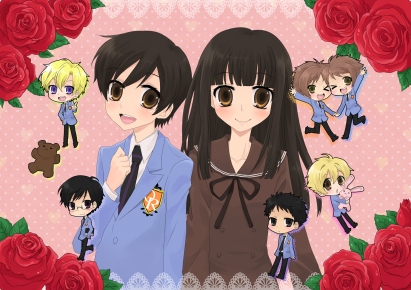Sexuality and gender both play a huge role in “girls anime” or shōjo anime, and it is especially important in otaku and doujinshi because it is here that we see both sexuality and gender tampered with even more so. Bishônen (or beautiful boys) is an element of anime that “rapidly became associated with adolescent explorations of gender and identity” (Darlington, 2010, p. 5). Essentially teenagers, in particular young girls, use these male characters and their relationships (platonic or otherwise) to project their own desires (p. 6). Through doujinshi fans are able to take the characters that they love and write them in to their own stories which push the boundaries of sexuality and gender.
This kind of attitude is outwardly explored in Ouran High School Host Club. It incorporates cross-dressing, homosexual lust and attraction, “twincest” and also makes use of the typical stereotyping seen in the boys love genre. The main character is a girl cross-dressing as a boy, and then each of the boys in the host club play different roles of the “Cassanova” figure, the “kawaii” one, the “strong silent” one, and the quiet intelligent one. Tamaki (the “Cassanova”) is a character who represents questioning ones sexuality as he often finds himself attracted to Haruhi both when she is herself and when she cross-dress as a boy. Ryoji “Ranka” Fujioka (Haruhi’s Dad) is a transvestite and “entertainer” at a bar thus another example of a cross-dressing character.
As Darlington states “Ouran engages two important aesthetic traditions, both of which explicitly question traditional sexualities and gender roles, the queer practice of camp and the fan practice of parody”. In order to understand Ouran High School Host Club and its humour you need to know what conventions they are parodying. Without an understanding of how sexuality and gender are portrayed in anime and then exaggerated in otaku and doujinshi the ingenuity of the show is missed.
Exploring this aspect is important for my autoethnographic study as the experience you have watching the show is dependent on what prior knowledge you have. As I’ve shown before in this post an anime amateur won’t get the full effect of the show instead it will just be the most nuts and funny thing you’ve ever seen.
Reference:
Darlington, T. 2010, ‘The Queering of Haruhi Fujioka: Cross-Dressing, Camp and Commoner Culture in Ouran High School Host Club’, Interdisciplinary Comics Studies, vol. 4, no. 3, pp. 1-19.

I like that extra layer you mentioned about watching the show, in that if you don’t know what it’s about, then it’s just the most nuts thing you’ve ever seen. When roping an audience member in you want that crazy element, but I wonder, do you think it ever pushes the boundary too far, so that if you don’t know anything about it, the whole concept is lost and you end up withdrawing and not engaging at all, or is it just safe enough?
Also I love that it switches up gender roles and displays sexuality on a spectrum, is it sensitive to the troubles that are faced by the LGBTQ community? or is there some ways it could be taken as just a ploy to make things extra edgy for the viewer?
LikeLike
So to my understanding otaku and doujinshi are the same as fandoms in the western sense. So if I were to look at it like that assuming that what I have said is correct, this anime is parodying fan-fiction. I feel that because I have immersed myself within the world of fandom, even though it is a more Western version of the idea, I would be able to appreciate the point the show is trying to portray. However I understand how someone who did not belong to a world such as this would feel completely lost. I find it funny that gender and sexuality can be experimented on so much within these sort of worlds. It almost feels as though it doesn’t need to exist, as fans are likely fantasise any scenario they see fit.
LikeLike
It’s interesting to think that when the characters are created they’re done with fan fiction in mind. It’s a good way to let the audience explore aspects that the original text didn’t. It’s also interesting in that it plays off of tropes that exist in similar stories but if you don’t understand them, as I wouldn’t, then you can still enjoy how “nuts and funny” the show is. Good effort picking that up, it’s easy to just get drawn in to what you’re researching.
LikeLike